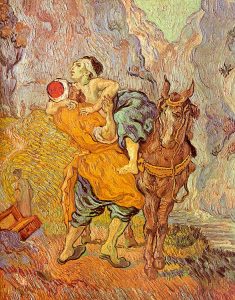Last week my Advent post revolved around the question Is There Room For Jesus to Find a Home in Our Hearts. This week I want us to think about how comfortable we might feel in the kingdom of God.
The final coming to which Advent points us is the coming of Christ and his kingdom of justice righteousness and abundance for all at the end of time. This is meant to be a deep longing that whets our souls for the coming in all its fullness of the eternal world of God for which we should strive with every breath.
But how comfortable will we be in the kingdom? N.T. Wright says that the language of the kingdom is love. I think it is not just the language, it is the culture. It permeates everything that happens in God’s eternal world. It is more than the words we speak. It is what fires our imagination. In the words of this prayer by Father Pedro Arrupe is determines what we do with our time what breaks our hearts and what gives us joy.
Jesus frequently tells his disciples to “love the Lord your God with all your heart and love your neighbours as yourself.” Do this and we will accomplish all that the prophets and the law asks of us. James calls this the royal law.
I have spent many years travelling in countries not my own, feeling uncomfortable in the culture, unable to understand the language. It is hard. I suspect that for many of us the kingdom of God will be just as uncomfortable a home as these foreign lands have initially been for me.
Unfortunately I have never become proficient in any language other than English primarily because I was rarely in a country long enough to immerse myself in the language, learn the words and put them into practice.
So how do we learn the language and culture of God’s world? How do be learn to be comfortable in the kingdom for which we long with every breath?
First we learn to speak the language of love and the place that we learn it is in the place of prayer. As I say in my book Return to Our Senses,
I imagine prayer as any process that draws us toward God and God’s new kingdom where we walk, talk and commune with our loving God in a place of abundance and peace and harmony for all. I imagine prayer as a new way of looking and listening and interacting with the world so that we are constantly uncovering the love of God which shines through every moment and enlivens every creature (p5)
Then we need to practice the language.
Paul begins his great discourse on love by saying “let me show you the way of life that is best of all (1 Cor 12:31). Learning to practice love both for God and for our neighbours in every moment of the day is the best life any of us can attain to. It is the only way to truly connect our hearts to the heart of God and discover that intimacy which all of us crave. (p44)
Probably the most wonderful example of someone who came to find his home in the kingdom and live in its culture while he was here on earth is the apostle John. He walked more closely with Jesus than anyone. He must have immersed himself in kingdom ways as he watched and talked to his beloved friend. He began life as a son of thunder which means he probably had a volatile temper. He became the apostle of love. His letters provide wonderful glimpses into what that culture looks like and he tells us:
We know what real love is because jesus gave up his life for us. So we also ought to give up our lives for our brothers and sisters. If someone has enough money to live well and sees a brother or sister in need but shows no compassion-how can God’s love be in that person? Dear children, let’s not merely say we love each other; let us show the truth by our actions. (1 John 3:16, 17).
And if you are looking for a more contemporary role model, Nelson Mandela is someone to emulate. Acting from love rather than hate he transformed his country.
We will not find a comfortable home in God’s kingdom unless we practice its ways now – learning to speak its language, learning to act according to its customs, becoming passionate about justice, healing and caring. Committing our lives to overcome oppression, share with those who are destitute, or hungry, caring for the creation that is God’s loving gift to us. The evidence is that this is why the early church grew so rapidly. Not just because it talked about love but because it practiced it in an outrageous, revolutionary way.
This is the life towards which the advent of Christ beckons and challenges us. Will you make God’s kingdom ways your ways? What new commitments could you make in the coming year to see the culture of God’s kingdom enter our world and touch the lives of those around you?

